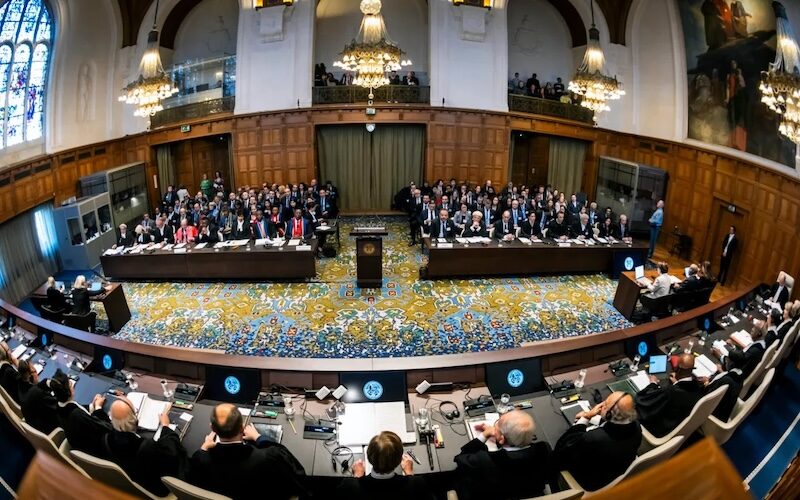The ICJ has found decisively that Israel may have a case to answer for genocide in a preliminary judgment whose orders will reverberate around the world. What now of Australia’s support for the government of Benjamin Netanyahu? Farah Abdurahman reports.
The International Court of Justice has ordered provisional measures against Israel to stop acts of genocide, allow humanitarian aid to Gaza and report to the ICJ on its compliance in a month.
The Court did not order an immediate ceasefire but struck down Israel’s claim to have the case dismissed and ordered Hamas to release the Israeli hostages immediately. A genocide case can drag on for years, but given the urgent circumstances, the ICJ has made provisional orders, and the voting was decisive, all orders backed by the Court by a vote of either 15-1 or 15-2.
The Court noted statements from Israeli government ministers that indicated intent for genocide and outlined the evidence of genocide, including the high death toll, the destruction of infrastructure and housing, the effects on mothers giving birth, and the lack of medical aid and food and water.
The ICJ ruled that Israel must take all measures to prevent offences under Article II of the Genocide Convention and that its military must desist from engaging in such acts as follows:
- Killing members of the group;
- Causing serious bodily or mental harm to members of the group;
- Deliberately inflicting on the group conditions of life calculated to bring about its physical destruction in whole or in part;
- Imposing measures intended to prevent births within the group.
Further, the ICJ ruled that Israel must:
- Prevent and punish the direct and public incitement to commit genocide against the Palestinians.
- Provide basic services and humanitarian assistance to address the adverse conditions of life faced by Palestinians.
- Take effective measures to prevent the destruction of and ensure the preservation of evidence-related offences committed under articles 2 and 3 of the genocide convention.
- Submit a report of all measures taken to the ICJ within one month.
Rulings made by the International Court of Justice are binding, however the court has limited ability to enforce such measures. Enforcement relies on the UN Security Council to uphold judgement, with permanent members able to exercise veto powers.
Israeli Prime Minister Benjamin Netanyahu last week declared in a televised address that no prescribed measures would hinder his ongoing plans for war. “Israel will not be deterred by the International Court of Justice from pursuing its Gaza war until total victory.”
No one will stop us – not The Hague, not the Axis of Evil, no one.
The ruling comes amid the Israeli PM rejecting a two-state solution to grant Palestinians the right to sovereignty and self-determination, with calls by former Israeli Prime Minister Ehud Barak for an immediate election to oust Netanyahu and end the war in Gaza.
While several countries and organisations backed South Africa’s suit – Malaysia, Turkey, Jordan, Bolivia, the Maldives, Namibia, Pakistan, Columbia, and members of the Organisation of Islamic Countries (OIC) – the Australian government affirmed its support for Israel with no public commitment to uphold the ICJ rulings as a signatory to the convention.
Israel’s bombardment of Palestinians: is Australia complicit in war crimes?
In the past, Australia has taken a firm stand in its commitment against genocide, which requires contracted parties to “Prevent and Punish” the crime.
In 1991 Australia was instrumental in obtaining a diplomatic solution to prevent genocide after East Timor sought independence from Indonesia. Australia also contributed more than $44 million to establish an extraordinary court in Cambodia to try senior leaders of the Khmer Rouge for genocide.
But in recent years, Australia has failed groups such as the Uyghurs in China and the Myanmar Rohingya. Both Muslim minorities in their respective countries.
Remarks from then Foreign Affairs Minister Julie Bishop echoed sentiments made by Penny Wong in relation to Gaza – “We continue to call for restraint by the Myanmar authorities, for the protection of civilians, and for unfettered access to be granted to humanitarian workers.”
Many Australian supporters of Palestine feel that without the backing of strong political condemnation, mounting international resistance will have little impact apart from worsening conditions for Gazans who remain trapped in the world’s largest open-air prison.
Lee Jonah Cohen from Melbourne’s Loud Jew Collective said the group supported South Africa’s case against Israel for genocide.
“We take the lessons of the Holocaust very seriously in standing against genocide against any people.
“While as a collective, we maintain some scepticism about international law, given its long history as a tool of Western imperialism, we fully back its strategic use against genocide and apartheid.
“The South African case appears to us as indisputable, and it is providing an important intervention into the legal and political sphere. Australia should be issuing public statements of support for the South African case.”
South Africa claims genocide
In the opening address on Day 1 of the ICJ hearing, Minister of Justice for the Republic of South Africa, Ronald Lamola, iterated that:
“No armed attack on a state’s territory, no matter how serious — even an attack involving atrocity crimes — can provide any justification for, or defence to, breaches of the (Genocide) Convention, whether as a matter of law or morality.
“The violence and the destruction in Palestine and Israel did not begin on 7 October 2023.
Israel continues to exercise control over the airspace, territorial waters, land crossings, water, electricity, and civilian infrastructure, as well as over key government functions.
Gaza is still considered by the international community to be under belligerent occupation by Israel.”
The abhorrent treatment of Palestinians across Gaza and the Occupied West Bank by Israel does not differentiate a child from the elderly, the infirm or the outright disabled.
As Special Counsel for South Africa, Adila Hassim outlined in her oral submission, “This killing is nothing short of the destruction of Palestinian life.
It is inflicted deliberately. No one is spared, not even newborns.
Aid, what aid?
Gaza is experiencing a famine, with an unprecedented 93 per cent of the population facing crisis levels of hunger. United Nations Under-Secretary-General Haoliang Xu of China said getting aid into Gaza was becoming impossible.
“You think getting aid into Gaza is easy? Think again. Three layers of inspections before trucks can even enter. Confusion and long queues. A growing list of rejected items. A crossing point meant for pedestrians, not trucks.
“This is an impossible situation for the people of Gaza, and for those trying to help them.”
Euro-Med Human Rights Monitor reported that Israel not only prevents the entry of aid into Gaza but also targets and kills those who try to retrieve it.
Such was the scene in recent days when Israeli-occupied forces opened fire on hundreds of Palestinians waiting for aid in northern Gaza, killing 20 and injuring around 170 civilians.
This incident is not isolated. Earlier this month, at Al-Rashid Street in the west of Gaza City, at least 50 people were killed and dozens more injured after an Israeli tank and two quad-copters opened fire.
World Food Programme aid coordinator AB said thousands of Palestinian men and boys walked more than 10kms to reach the aid drop point where trucks carrying medicine and flour had converged.
“Most left empty-handed. Some left without their limbs, others did not leave at all.
“Since October 7, Israeli-occupied forces have committed 1,993 massacres across the Gaza strip.
“Unequitable and insufficient aid has led to black-market sale of goods where a 25kg bag of flour is being sold to desperate Gazans for around $250 US.
“Palestinians who remain trapped in Northern Gaza have received very little to no aid at all due to the ongoing siege, attacks on aid convoys and severe destruction of civil infrastructure.
“Families stuck in the north are eating tree leaves to stay alive.”
Cultural genocide erases Palestinian history
Since October 7, more than 65,000 tonnes of bombs have been dropped on Gaza. A city the UN has called, “a graveyard of children.”
Israeli forces either completely or partially destroyed 295 schools, including universities, completely destroyed 145 mosques and partially destroyed a further 243.
Around 200 heritage sites were destroyed, including the ancient Anthedon Harbour, dating back to 800BC, and three churches, including the world’s third oldest church – the Greek Orthodox Church of Saint Porphyrius in Gaza City.
At least 360,000 homes have been bombed, with around 70,000 of those homes completely decimated. In just 111 days, 13,022 children have been killed.
Editor’s Note: it will take time for governments to respond to the ICJ decision. Australia belatedly voted in support of a ceasefire in Gaza at the UN but has refused to condemn the actions of the government of Israel and maintained its position as a ‘friend’ of Israel despite the atrocities. Now, given the case is proceeding, the government will have to review its position in regards of its arms sales to Israel, its other support such as Pine Gap surveillance, its diplomatic relations, the legal position of the estimated 1000 Australians serving with the IDF and the Future Fund’s investment in Israeli missile company Elbit Systems.
To not do so would risk Australia being legally complicit in genocide.
Six Eyes: Australia’s secret support for the Israeli assault on Gaza, through Pine Gap
Farah is a former political reporter for Fairfax Media. She has almost 20 years of media and communications experience in senior and executive roles working across government, research and innovation, and the private sector.

